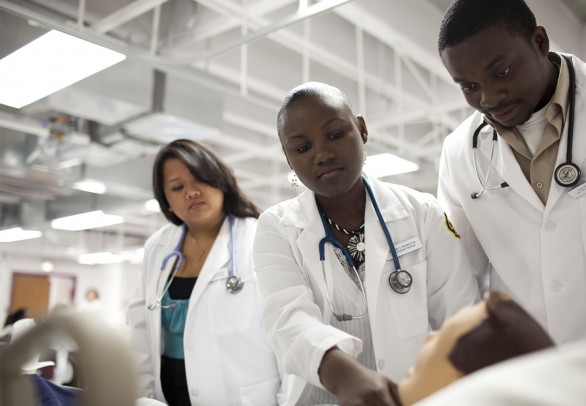UIC, City Colleges partner in bridge to sciences

A UIC program will recruit 58 underrepresented students from the City Colleges. “Researchers from underrepresented populations are in high demand, given persistent societal health disparities,” says Chancellor Paula Allen-Meares.
Backed by a $1.4 million federal grant, UIC will launch a new program to increase the number of underrepresented students who pursue degrees and research careers in the behavioral and biomedical sciences.
The five-year grant from the National Institute of General Medical Sciences, one of the National Institutes of Health, partners UIC with the City Colleges of Chicago.
The program will bolster recruitment, training, mentorship and degree completion in health-related fields for students from underrepresented backgrounds.
Beginning in 2014, the Behavioral and Biomedical Sciences Bridges to the Baccalaureate Program will recruit 58 students — 18 in the first year and 10 in each of the remaining four years — who qualify to transfer to UIC from the City Colleges.
Participants will pursue their UIC degree in one of three areas aligned with their research and career interests: nursing; public health; or liberal arts and sciences in subject areas such as biology, chemistry, psychology or physics.
“Researchers from underrepresented populations are in high demand, given persistent societal health disparities,” said Chancellor Paula Allen-Meares, the grant’s principal investigator.
“As one of the most diverse universities in the nation, UIC is well-positioned, and eager, to offer this program that will give transfer students from underrepresented backgrounds the skills to be successful not only in their academic career, but as professional health scientists,” Allen-Meares said.
The program will offer students an intensive summer research skills workshop, an assigned research mentor, access to peer-tutors, and support for science and academic skill development through group activities. A health science conference is planned.
Students selected for the program will begin preparation for baccalaureate studies at the end of their freshman year.
The program’s public health track will teach knowledge and skills not only in basic sciences, but in two disciplines — epidemiology and biostatistics — that are considered critical to understanding public health problems.
Students accepted to the undergraduate nursing program will be trained in research methods and statistical analysis, along with skills in managing the health care needs of individuals and communities.
Students in any of the liberal arts and sciences subjects will prepare for professional and graduate study in such specialties as cancer biology, tissue engineering and neuroscience.
“This program will enhance the students’ basic research skills, such as quantitative and qualitative analysis, critical thinking and innovation,” Allen-Meares said. “These skills, and the capacity for leadership and collaboration, will be gained by working alongside faculty members in their respective programs.”
Retention and graduation rates will be tracked during and after the funding period to gauge the success of the program’s student support system.
The participants’ educational and career paths after graduation will be followed to gauge the program’s success in elevating the number of students from underrepresented backgrounds that enter graduate programs, receive doctoral degrees and pursue research careers.
The program also aims to foster collaborations and professional development opportunities between UIC and City Colleges of Chicago faculty that will enhance the educational experience for participating students, Allen-Meares said.
Current partnerships between UIC and the City Colleges include the Guaranteed Admission Transfer program, which offers City Colleges students guaranteed undergraduate admission to UIC after successful completion of their first two years of college, and an NIH-sponsored Bridges to the Doctorate for Minority Nursing Students program in the College of Nursing.
The new program is also tied to UIC’s role directing the Illinois State Board of Education’s Health Science Learning Exchange, which began in 2012 as part of a $10.3 million public-private partnership to better prepare Illinois students for careers in science, technology, engineering and math fields.
Allen-Meares and Bruce Neimeyer, associate vice chancellor for special programs, are co-investigators for a five-year $833,090 grant from the Department of Education to coordinate the exchange’s statewide network of businesses, employer associations, education partners and others.
Co-investigators on the new National Institute of General Medical Sciences grant include Neimeyer, Karin Opacich, Brian Kay and Julie Zerwic of UIC and Michael Davis of the City Colleges of Chicago.
